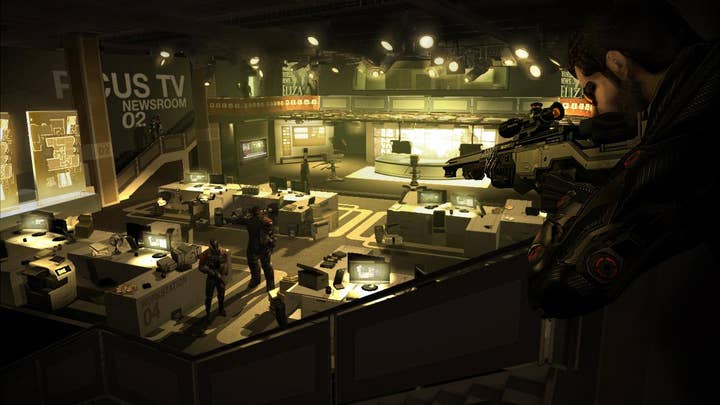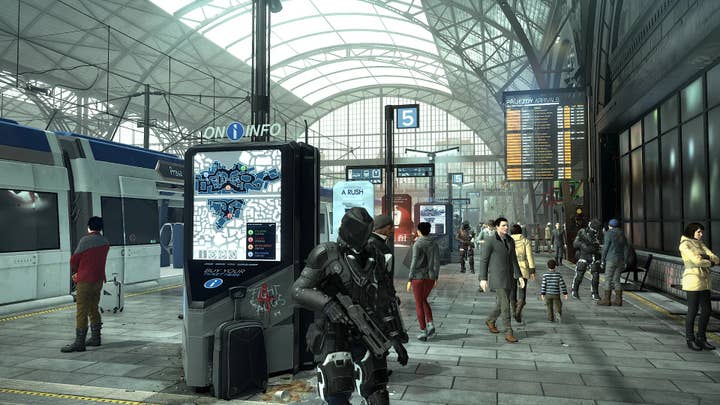Square Enix's Western studios were a "train wreck in slow motion"
Eidos Montreal founder Stephane D'Astous reflects on the issues he believes led to the studio's sale
On May 2, 2022, Stephane D'Astous began receiving emails and phone calls from former employees. The shared tone was a request for advice and perspective: What's happening? Is it a good sign, or should we be worried?
These messages, of course, referred to the shock news that Square Enix had sold Crystal Dynamics, Eidos Montreal and Square Enix Montreal, plus all the IP the trio of studios collectively held, to Embracer Group for a bewilderingly low $300 million.
Even though D'Astous was surprised by the price tag, the Eidos Montreal founder wasn't terribly surprised at how the studios' relationship with Square Enix turned out, saying the roots of its demise were evident even before he left the company in 2013.
"It was a trajectory that could be predicted," he tells GamesIndustry.biz. "I left because things were missing at head office. [Pre-Square Enix] Eidos has a great tradition of development teams, but they don't have superior knowledge of how to sell their games. And that was quite clear.
"You could look at all the great games that Eidos did, and -- apart from Tomb Raider back then, that was a whole different era -- the Hitmans and all those could have been a six, seven, eight-million unit projects. Deus Ex could have been that also. We hit good numbers, don't get me wrong, but I always felt that the way to sell games that Eidos used were so traditional and conventional. That it wasn't innovative. And it was always underselling the quality of the games.

"I hoped when Square Enix purchased Eidos in 2009 that that would change things."
Eidos Montreal was founded two years before Square Enix acquired the UK publisher, and at the time was only the fourth major studio in Montreal, alongside Behaviour Interactive and teams from Ubisoft and Electronic Arts.
The studio was structured to have three production pipelines, kicking off with revivals of the Deus Ex and Thief series while helping Crystal Dynamics reboot Tomb Raider by handling the multiplayer component as its third project.
"It was clear that the main purpose of Eidos Montreal was to increase capacity of production, or development capacity, within the group, because Crystal Dynamics was branded like a mono-project studio, as was IO Interactive," D'Astous explains. "Montreal was there to save the back catalogue. It was clear that we had great IPs that were sleeping on the shelf. Legacy of Kain that was discussed, but wasn't as strong as Deus Ex and Thief."
2011's Deus Ex: Human Revolution, the studio's first release, garnered critical acclaim and put Eidos Montreal on the map. The 2014 return of Thief was less well received -- although D'Astous says that game "remains one of my favourite projects" and maintains an extra nine months could have produced a much better product.
"We did our best, and we struggled, and that's life in development in games," he says. "You don't hit it off all the time. And we were close, but just missing some finishing touches."
He continues: "The Deus Ex development team was one of the strongest that I've assembled, and they were really united. They knew the challenges. With Thief, I didn't have that luxury to have a core group of people that had worked together previously, so I went to recruit strong people, very strong people, but they didn't have the opportunity to work together on previous games. And that maybe could be one of the reasons why it wasn't as smooth as Deus Ex."
"It was a train wreck in slow motion, to my eyes, anyway. It was predictable that the train was not going in a good direction"
Square Enix has become notorious for declaring multi-million-selling games to be disappointments, and D'Astous reports this extended behind the scenes as well. He recalls a meeting regarding the company's financial performance for 2012, where the Eidos group of studios was expected to generate $65 million in profit. Instead, he was told the developers had lost $65 million that year.
"We were dumbfounded," he says. "Especially because my studio didn't have any deliverables for that year."
D'Astous says he began receiving messages from the team, worrying about the fate of the studio, and repeatedly called on management in London to discuss a solution - only to receive silence.
"The pressure was starting to build, and my employees towards me, me towards my superiors," he says. "I think when people are in a crisis situation where there's a lot of situations, you do see their core behaviour or values. And I didn't like what I saw. There was really a lack of leadership, courage, and communication. And when you don't have those basic things, no employee can do their job correctly -- especially when you're heading a studio.
"I was losing hope that Square Enix Japan would bring great things to Eidos. I was losing confidence in my headquarters in London. In their annual fiscal reports, Japan always added one or two phrases saying, 'We were disappointed with certain games. They didn't reach expectations.' And they did that strictly for certain games that were done outside of Japan."

D'Astous left Eidos Montreal in summer 2013. Crystal Dynamics' studio head Darrell Gallagher left at the end of 2015. In 2017, IO Interactive successfully negotiated a management buyout, including the Hitman IP, after Square Enix began looking for a buyer to take the studio off its hands.
Even the group's biggest success, the rebooted Tomb Raider trilogy, was in decline with 2018's Shadow of the Tomb Raider receiving lower review scores than its two forebears. And then 2020's long-awaited Marvel's Avengers was poorly received.
"The plan has not been successful in the last decade. I don't know why it would be successful for the next ten years, because they're the same people, the same actors are there"
"It's a train that is slowing down and needs some injection of energy or money or something, but the train is slowing down," says D'Astous. "And it's unfortunate because there are a lot of good people in those studios."
D'Astous has been keeping a close eye on Square Enix and his former studio. He was intrigued when sister studio Crystal Dynamics signed a multi-project deal with Marvel, which eventually led to the beleaguered Marvel's Avengers and last year's Guardians of the Galaxy -- which, despite being well received by critics, "undershot initial expectations," according to the publisher.
"Maybe at the time [the deal was signed] the superhero thing was a big thing. It still is, but there is some fatigue with superheroes. And especially in games -- very few manage to be successful with superheroes. There's always Batman [from] the guys at Rocksteady. There was Spider-Man. But out of the people that have done it, the success rate of superhero games is not good.
"Maybe it was the easy way out. They might have thought that selling a superhero game is easier than a conventional game."
He continues: "If I read between the lines, Square Enix Japan was not as committed as we hoped initially. And there are rumours, obviously, that with all these activities of mergers and acquisitions, that Sony would really like to have Square Enix within their wheelhouse. I heard rumours that Sony said they're really interested in Square Enix Tokyo, but not the rest. So, I think [Square Enix CEO Yosuke] Matsuda-san put it like a garage sale."
That, D'Astous suggests, may explain the $300 million price tag for three AAA studios and a host of long-running IP, including the blockbuster Tomb Raider franchise. By comparison, Embracer purchased Gearbox in a deal worth $1.3 billion.
"They have about 1,000 staff. Eidos has about 1,000," D'Astous says. "They have basically Borderlands and others, and Eidos has five times the IPs. So why four times less? I guess there weren't a lot of key people interested. And it shows the health of the value of the potential of Eidos, unfortunately.
"It was a train wreck in slow motion, to my eyes, anyway. It was predictable that the train was not going in a good direction. And maybe that justified $300 million. That's really not a lot. That doesn't make sense."
D'Astous is unsure how much of the Eidos studios' underperformance can be attributed to Square Enix's management in Japan, but he does maintain that "some of the bad decisions came from London."
"They were there since the start, and some decisions I question. There have been no changes at the head office now for more than a decade. So, I think it's more of the same, to a certain point."
The hope is that Eidos Montreal, Crystal Dynamics and Square Enix Montreal may see a new lease of life under Embracer, which tends to allow its subsidiaries to operate autonomously. IO Interactive has certainly thrived since gaining independence, with Hitman 3 becoming the studio's biggest hit to date and the acquisition of the James Bond license represents an opportunity to grow further still.
D'Astous, however, is reining in his expectations given the unwieldy size of Embracer.
"[CEO Lars] Wingefors, I don't know how he's managing it up to now," he says. "I mean, yes, leave autonomy [to the studios] to a certain point, but you leave autonomy when there's a strong vision. IO knew what they wanted to do. I think they weren't able to do it when they were within the group of Eidos because of head office, so that changed their lives for them. But I would leave certain groups autonomous when they have demonstrated that they have a clear vision, knowhow, and leadership. And again, I've mentioned all the heads of studios that left the three studios of Eidos. There's a reason why I wasn't the only one who left.
"I hope that Lars really evaluated, spoke in deep conversation to see what they have as a plan, because the plan has not been successful in the last decade. I don't know why it would be successful for the next ten years, because they're the same people, the same actors are there. The same players are there.
"If no changes are done, the train will continue to slow down."

